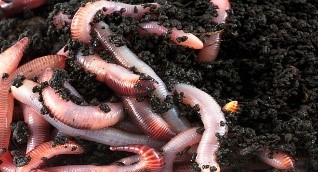INP-WealthPk
Faiza Tehseen
Rearing the red wiggler – a common composting worm – can help Pakistan overcome the shortage of chemical fertilizers and reduce the import bill. Talking to WealthPK, Principal Research Officer (PRO) of the Khyber Pakhtunkhwa Agricultural Research System Dr. Muhammad Shah Sarwar said the red wiggler is mostly used in Pakistan to produce vermicompost. Other than a compositing worm, it is also used as a fish bait.

‘’Red wigglers live only in organic matter, not in burrows, and can be reared outdoors as well as in mud sheds. The vermicompost business is on the rise in many countries, i.e. Canada, China, Australia, India, the US, etc. It is many times more powerful than any other organic compost prepared from agricultural or kitchen waste,’’ Dr Shah said.
‘’In the barn or backyard, about 272 sq. feet place is enough to take a start. A ton of dung heap is enough for a population of 10,000 red wigglers to produce 600kgs of quality compost in 35 days. This population also multiplies in the same duration. A standard worm-rearing bed is 3 feet wide, 10 feet long, and a foot or 1 ½ feet high. If its floor is not cemented, a plastic spread is used.
Then the rearing medium, i.e. animal dung is piled on it. For a fresh dung heap, water sprinkling and deranging at least for 3-4 days is important to emit methane gas completely to avoid poisoning. To keep the rearing medium’s humidity level not more than 60%, water is regularly sprayed on it. The bed is kept tilted at one side to drain the excess water. This blackish-brown water is called ‘wormy wash,’ which is an important by-product used as liquid fertilizer, tonic, repellent, etc.
Continuing the discussion, Dr. Shah said red wigglers are hermaphrodites with receptors instead of mouth or eyes and their skin is the medium to perform all of their body functions. Weekly, they produce a cocoon, normally containing 3 to 5 offspring which hatch in 15 days and mature in the next 18 days. Normally, they do not reproduce in more than 40⁰ and less than 25⁰. They avoid sunlight and only a lack of oxygen brings them to the surface of their living medium.
It is important to monitor and regulate. They must be kept covered under the rice husk, wheat chaff or wet jute bags during the summer. They die if oil of any type is spilled in their feed medium. Salt, citric acid, citrus fruit peels, strawberry chunks or its juice are equally fatal for them. The best medium to rear them is animal dung, wet old newspapers, cartons, egg trays, etc.
Moreover, he said this setup can be established with about PKR100,000. He said they were selling a 50kg bag of wormy compost at PKR1,250. A litre of wormy wash is worth R200 and a mature red wiggler worm is worth PKR5. Eggs/cocoons of red wigglers are also sold sometimes.
Dr Shah said the nursery owners repack the vermicompost and resale a pack of 900 grams for PKR100. He emphasized that the Pakistani farmers must establish this setup to earn profits and avoid the heavy bills of chemicals and costly fertilizers. The international vermicompost market is projected to reach US$234370 million at a compound annual growth rate (CAGR) of 14.9% by the year 2028 from US$101850 million in 2022.
It is important to raise awareness among Pakistani farmers so that they can make their farming more productive and cost-effective. Globally, it has become a profitable business due to the increasing trend of consuming the organic foods. Talking to WealthPK, owner and CEO of ‘No.1 Organics’, Dr. Muhammad Aasif Javaid from Rahim Yar Khan said he established the business of wormy compost production in 2019.
He took the start with an imported worm specie – the red wiggler. This small red-coloured yellow tipped specie is the ultimate composting worm that is not native to Pakistan. ‘’I live in the Cholistan desert in Southern Punjab that lacks many natural sources, i.e. quality food, water, etc. Malnutrition and toxic food are causing fatal diseases, especially cancer in human beings. My wife also fell victim to this disease and died seven years ago. The increasing number of patients in Pakistan led me to research.
The main reason was the toxic food. Different chemicals as fertilizers or other preventive measures are used to nourish and immune the soil and crop. The plant roots absorb all these chemicals from the earth and finally they become a part of our food, making our immunity systems vulnerable,’’ he said. He said, ‘’a wormy compost is 10 times stronger than any other organic one. It amazingly improves food quality. It not only nourishes the soil, but also increases a crop’s immunity to diseases.
Its by-product wormy wash is also the best repellent. Now my units are working in a few other major cities, i.e. Okara, Muridke, Lahore, Karachi, etc. Sindh Minister for Livestock and Fisheries Abdul Bari Pitafi has invited me to establish a vermiculture setup in Mirpur Mathelo. Afterward, multiplication technology and free training along with active mediums will be provided to other people across the province.’’
Dr Aasif said they were selling a kilogram of vermicompost at PKR35 and growth medium (red wiggler colony including adults, eggs, and offspring along with living and feeding material) at PKR5,000 per kg. ‘’We helped about 150 people to establish their own commercial setups of vermicompost,’’ he added.
Credit : Independent News Pakistan-WealthPk



